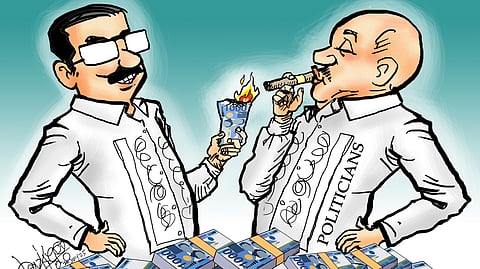
- NEWS
- the EDIT
- COMMENTARY
- BUSINESS
- LIFE
- SHOW
- ACTION
- GLOBAL GOALS
- SNAPS
- DYARYO TIRADA
- MORE

The business sector is taking notice of the poor governance and the inefficient use of public funds, which could be a factor for the declining revenue collections.
This has prompted the Development Budget Coordination Committee, which comprises the government’s economic managers, to lower the tax collection target for this year.
An outspoken business leader said the wrong priorities in the use of public funds is no longer a joke.
“There’s nothing funny about it. We see politicians buying votes, promising the moon, and ultimately, destroying the very fabric of our nation,” John Gaisano said on social media.
He directed his criticism at the cash subsidies and other doles that are now the staple of the anti-poverty program.
“It’s the stupidity of governance playing out right before our eyes, and it’s far from a laughing matter,” he said.
“Think about it: why would anyone strive for success when just sitting back can get you a handout? Why should hardworking Filipinos, who sweat and toil every day, carry the burden for those who simply choose not to contribute? We aren’t building a nation of self-reliant individuals; we’re inadvertently creating a generation hooked on welfare, fostering a dangerous cycle of dependency,” Gaisano lamented.
The businessman’s chagrin was reflected in the recent Pulse Asia survey that showed a majority disapproval of the initiatives to control inflation (66 percent) and reduce poverty (54 percent).
More than P120 billion has been spent on doles this year, which many associated with the buildup for the midterm polls.
The Walang Gutom Program, Ayuda sa Kapos ang Kita Program (AKAP), Tulong Panghanapbuhay sa Ating Disadvantaged/Displaced Workers (TUPAD), and Assistance to Individuals in Crisis Situations (AICS) are all cash subsidies disguised as sectoral assistance programs.
Hard-earned tax money, “the very fruits of our labor, should be a powerful investment in a thriving society,” Gaisano stressed.
Instead of cash handouts, the government should invest in “not just better roads, but excellent ones, and genuinely affordable, government-subsidized public transportation that makes our daily commute easier and cheaper,” he held.
Education should also be a priority, to make it accessible and affordable for every Filipino family, “not just free programs that often fall short in quality.”
Funds should be earmarked for the support of farmers across the country because their success, Gaisano said, “literally puts food on all our tables.”
Efforts should be made by the government to significantly lower the energy costs of every household and small business, not just the massive corporations.
Gaisano recommended “genuine peace and order, where people can truly live without fear, achieved through effective security forces, not just bloated salaries for political support.”
He emphasized the importance of providing real, tangible support and assistance to small and medium-size businesses, “the brave entrepreneurs who are the backbone of our local economy and create jobs.”
These recommendations have been with the government of every administration — which means that little has been done to address them.
As seen in the controversies surrounding the 2024 and 2025 national budgets, legislators have the short-term perspective of prioritizing doles rather than lasting development programs to benefit their immediate political objectives.
Short-sighted officials would always prefer to give ayuda over development projects that have no bearing on their self-interest.
